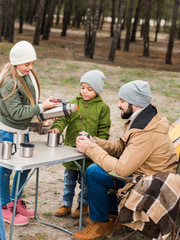The Educational Perks of Family Wilderness Getaways
Family getaways provide some of the best memories for your children. Wilderness-based getaways, in particular, can be especially unforgettable, from the breathtaking views to the fun family hikes to bonding around a campfire or on a road trip.
In addition to the fun and leisure you enjoy as a family on nature vacations, they can also be some of the best educational experiences for your kids.
Family Wilderness Getaways Can Be Learning Experiences
You probably already know this, but all learning doesn’t happen in the classroom. So many of the skills and abilities your child develops come from the experiences they have outside of school or traditional learning situations, like vacations.
Educational opportunities can absolutely happen on trips to Disneyland. However, family wilderness getaways offer unique chances for your child to grow personally and academically. Keep reading for what kids can learn while on a family nature vacation.
Engage in nature and wildlife lessons
The obvious lessons your child can learn while on an outdoor family adventure pertain to nature and wildlife. It’s one thing to read and watch videos about plants, flowers, insects, animals, and all of nature’s other beauties. It’s another to experience them in real life.
For example, let’s say you decide to go camping with the kids. While on your hikes and nature walks, you can engage in plant identification.
Let your kids make a list of the plants they want to see. In addition to what they want to see, add common poisonous plants your kids should know about, like poison ivy, giant hogweed, nightshade, and oleander.
It benefits them to know about these plants as well as the good ones if they’ll be spending time outdoors. You can show them the plant and then talk about what to do should they touch it or come into contact with it in another way.
You can do the same kind of identification activities with animals, insects, flowers, trees, and so forth.
Your child also has a chance to learn skills that will help them survive in a natural setting, like:
- How to start a fire
- First aid essentials
- How to find and purify water
- What animals and plants are safe to eat
- How to navigate the wilderness without technology
- How to put up a tent or build shelter in the woods
Not only do these skills help your child in nature, but they’ll also develop other positive attributes and learn the value of things like discipline.
Grow essential life skills
Survival skills aren’t the only skills your kid can develop while on a family wilderness getaway.
There are many opportunities to grow essential life skills while on these adventures. Your child needs to start working on as many as they can as early as they can to increase their chances of thriving in adulthood. Examples of fundamental life skills include:
- Budgeting
- Cleaning
- Communication
- Creativity
- Decision-making
- Problem-solving
- Socialization
- Critical thinking
Family wilderness vacations present many opportunities for your child to develop the above skills and others that are essential to living productively and comfortably as they get older.
For example, you can practice budgeting when planning the trip. You can show your child the best practices for cleaning up after themselves when outdoors. They can practice communicating through conversations they have with you and their siblings while bonding on vacation.
Their creativity can come out while playing in the mud, trees, and on beaches. Your child has a chance to socialize when they come across other kids or adults while hiking, camping, or riding bikes. When they face challenges like learning how to read a map, they can exercise their critical thinking and problem-solving skills.
Traveling and taking nature vacations enriches your child’s learning by helping them cultivate essential life skills.
Learn the importance of family bonding
One of the best things about a vacation in the wilderness is the disconnection from technology.
A lot of places in nature don’t have a cell signal. So, scrolling on social media, playing online games, and watching shows aren’t likely to happen.
This can be amazing for family bonding. No one can hide behind technology. Instead, everyone is forced to engage with each other and be present in the experience, helping your child foster stronger bonds with their family members and create lasting memories.
Note that it’s important to properly prepare for your outing when you know there won’t be any cell signal to ensure your family stays safe. Make sure at least one person knows where you’ll be. Learn simple navigation techniques and how to use a map and compass. Pack appropriately and bring satellite-based communication devices if possible.
Kids can find out more about themselves
Many adults can attest to how immersing themselves in nature helped them grow better relationships. There’s so much time for reflection through activities like nature walks, hikes, boat rides, and lounging by the beach.
Your child has the same opportunity to find out more about their interests on a nature-based vacation. Let them dive into their curiosities. Allow them to engage in nature activities they’ve expressed an interest in. Let them roam through the wilderness a bit (with you right behind them of course). Engage in those intimate conversations with your older kids that expose their wildest dreams and fears.
The more understanding of and in love with themself they are, the better your child will feel and function in life.
Ensure Your Next Family Nature Vacation is Educational and Fun
A family wilderness getaway will be incredibly fun and exciting for your child. But the vacation can have a deeper impact on their being if you make sure it’s as educational as it is fun. So, take advantage of the learning your child can do on your next family nature getaway.
About the Author
 Katie Brenneman is a passionate writer specializing in education, mental health, family lifestyle and online safety. When she isn’t writing, you can find her with her nose buried in a book or hiking with her dog, Charlie. You can follow her on Twitter.
Katie Brenneman is a passionate writer specializing in education, mental health, family lifestyle and online safety. When she isn’t writing, you can find her with her nose buried in a book or hiking with her dog, Charlie. You can follow her on Twitter.




